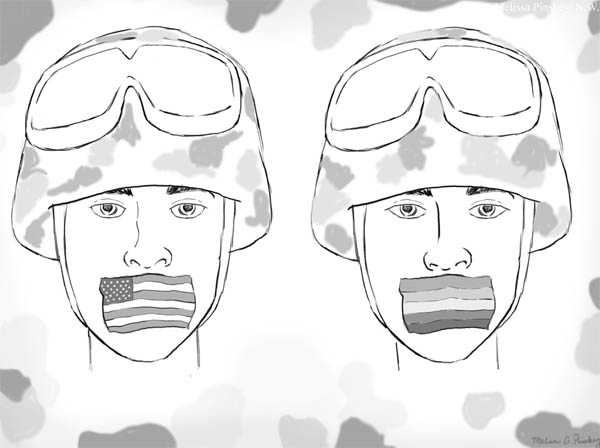A recent ruling by a California federal judge may finally succeed in repealing the “don’t ask, don’t tell” (DADT) policy in the military. The judge ruled the policy unconstitutional and ordered the end of the policy worldwide. By the end of the year, the discriminatory policy may finally be over.
In September, when the Senate considered the Fiscal Year 2011 Defense Authorization Act, the major point of discussion was the “don’t ask, don’t tell” policy in the military, which would have been repealed if the bill had been voted into law. In fact, the majority of discussion – for or against – this bill was surrounding “don’t ask, don’t tell.” According to the American Military Society of Comptrollers, Republicans opposed the bill on three points. One, they believed that until they knew the repercussions of the repeal would have on “defense readiness,” they did not want to consider it. Two, Sen. Harry Reid proposed an amendment to include the Development, Relief and Education for Alien Minors (DREAM) Act, which would provide a way for illegal immigrants who were brought here as minors to obtain citizenship. Republicans felt this was not related to the bill. Finally, they felt they were not given the opportunity to offer additional amendments to the bill.

Considering the first complaint against the Fiscal Year 2011 Act, what possible repercussions to “defense readiness” would there have been? We’re talking about allowing soldiers the right to discuss their sexuality openly. Do Republicans seriously think that this discussion would affect our battle readiness? Homosexual men and women are, of course, already mixed in with units overseas, abroad and at home. The only thing this repeal would do is allow individuals to be open about who they are. We don’t have a similar restriction on the discussion of religion, race or ethnicity. Why must homosexuality be an exception?
The complaint about not being given the opportunity to offer additional amendments to the bill is perhaps a valid point. If it is true they were not afforded that opportunity, then they should have been. The issues at stake here are too important to be lost on the altar of procedure.
As for the DREAM Act complaint, bills are notorious for having amendments that have nothing to do with the main body of the bill.
All of this because Republicans (and a few Democrats) disagreed with repealing “don’t ask, don’t tell.” All of this because this nation would rather not think about homosexual men and women serving in the military, regardless of their bravery or credentials.
All of this because we live in a nation afraid or unwilling to take the next step in the evolution of our country’s history: complete acceptance, or, at the very least, tolerance, of homosexual men and women.
Former presidential candidate and current senator John McCain succeeded in his filibuster in congress. Because of this, we must now wait for Congress to decide to discuss important issues like these again. To be sure, the issue of repealing “don’t ask, don’t tell” is not an issue that is going to go away.
Yet, many people today still refuse to give homosexual men and women the same rights and freedoms afforded to all other groups. Homosexual men and women are not allowed to call themselves such in the military. They are not allowed to marry. Only 22 states allow lesbians and gay men to adopt children through state-run or private adoption agencies. The situation has gotten so bad that a series of what the media is referring to as “the gay suicides” has taken place.
When this country was founded, one of the main principles guiding its foundation was that all people were created equal. At the time, that pretty much only applied to white male landowners. But slowly and surely, it began to apply to virtually all groups, races, genders and religions. All except one: homosexual men and women.
If one were to look over the history of this nation from a prejudicial standpoint, the acceptance of so many different cultures and races begins to look inevitable. Each victory for one group was a precursor to the victory of another.
We must look back to our forefathers and realize that all people –– regardless of race, gender, sexual orientation, or anything else –– are created equal.

























Stephanie Smith • Oct 23, 2010 at 6:27 am
Part of the research into how DADT will affect the military is on the spouses, how does what a spouse of a serving member feel about gays openly serving have an effect on DADT? It really doesn’t, most spouses are busy with their lives, preparing for and living through deployments to be concerned if one of their spouses co-workers may find their spouse attractive. The lack of interest by most spouses doesn’t stop the government from holding polls and open discussions focused solely on the spouses responses.
Republicans refuse to vote on DADT until the research about it’s change is completed, I’m sure some of the research is valid but some of it is also just a means to prevent its completion.